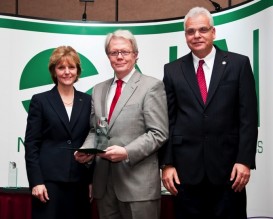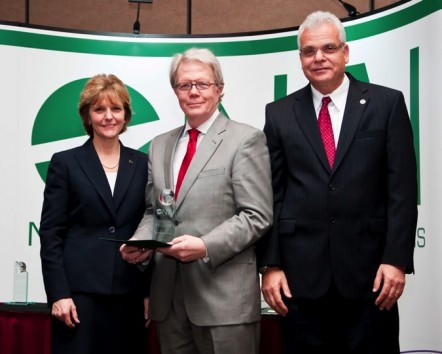
Huntington Potter, Director of Alzheimer’s Research at Crnic Institute for Down Syndrome, Inducted into National Academy of Inventors
Renowned Alzheimer’s and Down syndrome researcher holds 15 U.S. patents

Huntington Potter, with U.S. Commissioner of Patents Margaret A. Focarino and NAI President Paul Sanberg
DENVER (March 14, 2013) – Huntington Potter, Ph.D., Director of Alzheimer’s Research at the Linda Crnic Institute for Down Syndrome and the University of Colorado School of Medicine’s Department of Neurology, was inducted into the National Academy of Inventorsby being named a Charter Fellow.
Potter’s groundbreaking research in the field of Alzheimer’s disease led to the discovery of the mechanistic relationship between Alzheimer’s and Down syndrome. During his esteemed career, he invented the first practical electroporation device for making transgenic organisms and has been awarded 15 U.S. patents, including several on diagnosing and treating Alzheimer’s disease.
Potter is among 101 innovators from 56 research universities and nonprofit institutes to be inaugural fellows and was inducted by the United States Commissioner of Patents, Margaret A. Focarino, at the 2nd Annual Conference of the National Academy of Inventors on Feb. 22 in Tampa, Fla. Inductees include eight Nobel Prize winners, and four recipients of the National Medal of Science, including Robert Gallo, who co-discovered the HIV virus, Solomon Snyder, who discovered the mechanism of addiction, and Nick Holonyak, who invented the first practical LED.
The National Academy of Inventors is an organization of universities that have intellectual property programs and is open to researchers who hold U.S. patents.
“Throughout his career, Huntington Potter has demonstrated the leadership and innovation the selection committee looked for in charter fellows,” said Paul Sanberg, president of the National Academy of Inventors and senior vice president for Research & Innovation at the University of South Florida. “His work has contributed materially to the understanding and treatment of Alzheimer’s disease — in particular, his discoveries regarding amyloid formation and Alzheimer’s connection to Down syndrome were breakthroughs in the field.”
Potter’s recent research includes the GM-CSF treatment for Alzheimer’s, which involves the drug Luekine. GM-CSF is a protein that is secreted by patients with rheumatoid arthritis that may help explain why those patients rarely develop Alzheimer’s disease. Mice with Alzheimer’s disease that have been injected with Leukine were cured, and the invention is being proposed as a treatment for Alzheimer’s in humans, with clinical trials underway in Tampa and soon to follow in Denver.
Leukine is already approved in humans as a bone-marrow stimulant. Potter’s invention would extend its use as a treatment for Alzheimer’s. Potter is the principal investigator on the grant for the Leukine experiments, along with the Linda Crnic Institute and the University of Colorado Denver.
“Dr. Potter is truly at the top of his game when it comes to innovation and groundbreaking research, and we’re proud to have him at the Linda Crnic Institute,” said Tom Blumenthal, Ph.D., Executive Director of the Crnic Institute.
Potter, a professor at the medical school, joined the Linda Crnic Institute in 2012 to further research in the connection between Alzheimer’s disease and Down syndrome. People with Down syndrome, who have an extra copy of chromosome 21, are much more likely than their typical peers to develop the physical symptoms of Alzheimer’s. Studies have shown that because of their extra copy of the Alzheimer’s gene, virtually all people with Down syndrome will develop the pathology (plaques and tangles) in the brain associated with Alzheimer’s. It is estimated that about 50 percent of people with Down syndrome will develop the memory problems of Alzheimer’s before age 50.
Potter believes studying people with Down syndrome in Alzheimer’s research is a promising new approach because it would be based on a group of people who tend to get Alzheimer’s and would stand to benefit greatly by treatments that support nerve cells to help correct damage that has already occurred.
The University of Colorado has the only major medical center looking at Alzheimer’s and Down syndrome in parallel, Potter said.
Prior to joining CU, Potter studied, researched and taught for 30 years at Harvard University. In 1998, he joined the University of South Florida as the Eric Pfeiffer Chair for Research on Alzheimer’s Disease.
About the Global Down Syndrome Foundation
The Global Down Syndrome Foundation is a public nonprofit 501(c)(3) dedicated to significantly improving the lives of people with Down syndrome through research, medical care, education and advocacy. Formally established in 2009, the Foundation’s primary focus is to support the Linda Crnic Institute for Down Syndrome, the first academic home in the U.S. committed to research and medical care for people with the condition. Fundraising and government advocacy that corrects the alarming disparity of national funding for people with Down syndrome is a major short-term goal. The Foundation organizes the Be Beautiful Be Yourself Fashion Show — the single-largest annual fundraiser benefiting people with Down syndrome. Programmatically, the Foundation organizes and funds many programs and conferences, including the Dare to Play Football and Cheer Camps, Global Down Syndrome Educational Series, and Global Down Syndrome Multi-Language Resource Project. The Foundation is an inclusive organization without political or religious affiliation or intention.
About the Linda Crnic Institute for Down Syndrome
The Linda Crnic Institute for Down Syndrome is the first medical and research institute with the mission to provide the best clinical care to people with Down syndrome, and to eradicate the medical and cognitive ill effects associated with the condition. Established in 2008, the Crnic Institute is a partnership between the University of Colorado School of Medicine, the University of Colorado Boulder, and Children’s Hospital Colorado. Headquartered on the Anschutz Medical Campus in Aurora, the Crnic Institute includes the Anna and John J. Sie Center for Down Syndrome at Children’s Hospital Colorado. It partners both locally and globally to provide life-changing research and medical care for individuals with Down syndrome. The Crnic Institute is made possible by the generous support of the Anna and John J. Sie Foundation, and relies on the Global Down Syndrome Foundation for fundraising, education, awareness and government advocacy. It is a research and medical-based organization without political or religious affiliation or intention.
###
Recent Posts
- Singer Jordin Sparks Performs and Rep. Frankel and Rep. Hudson Honored at Global Down Syndrome Foundation’s May 9th AcceptAbility Gala in DC
- Global Down Syndrome Foundation is Proud to Support Cheeky Awareness Video “Assume That I Can” Taking the Internet by Storm
- Global Down Syndrome Foundation Launches Matching “21 for 21” Campaign for World Down Syndrome Day with Support from the Safeway Foundation
- Global Down Syndrome Foundation Applauds House Energy & Commerce Committee for Advancing Legislation to Authorize Down Syndrome Research Program at NIH
- Important NIH INCLUDE Legislation Aimed at Increasing Lifespan and Dramatically Improving Health Outcomes for People with Down Syndrome Introduced by GLOBAL Champion, Congresswoman Cathy McMorris Rodgers

 Experience our inspirational and groundbreaking videos and photos. Our children and self-advocates are beautiful AND brilliant!
Experience our inspirational and groundbreaking videos and photos. Our children and self-advocates are beautiful AND brilliant! Make sure your local Representatives are on the Congressional Down Syndrome Task Force.
Make sure your local Representatives are on the Congressional Down Syndrome Task Force.